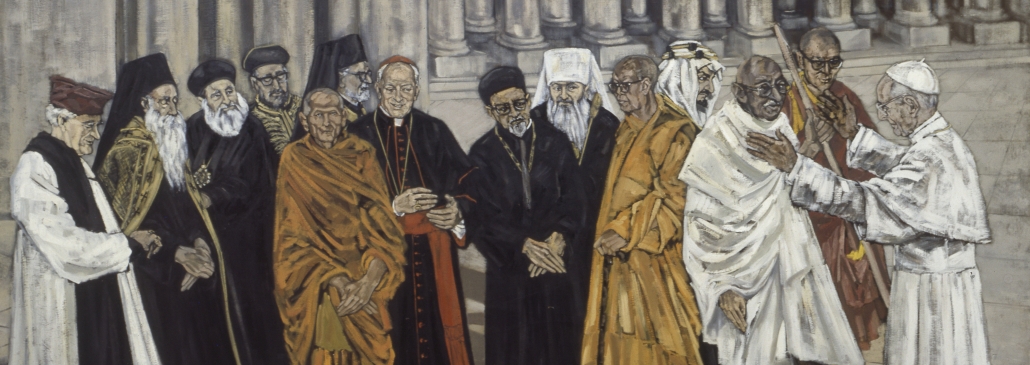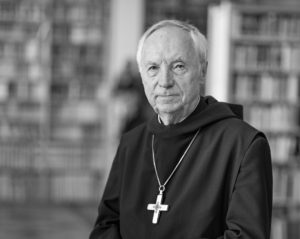“Mutual respect is the condition and, at the same time, the aim of interreligious dialogue.” -Pope Francis
Interreligious Audience for 50th Anniversary of Nostra Aetate, 28 October 2015

Pope Paul VI
The Dalai Lama
Mahatma Gandhi
King Feisal
Dhammayana Maha Thera Phra Buddhajinorot
Nikodim
Khoraiche
Card. Pignedoli
Somdet Phra Wannarat
Athenagora
Michael Ramsey
Melitone
Click here to read and download an explanation of the painting found at the entrance of the Dicastery for Interreligious Dialogue office in Rome.
Goals and Activities of the Dicastery for Interreligious Dialogue
In a 1967 decree Pope Paul VI laid out the objectives of the Dicastery for Interreligious Dialogue (initially called the Secretariat for non-Christians): “To search for methods and ways of opening a suitable dialogue with non-Christians. It is concerned therefore that the non-Christians are known well and are justly esteemed by Christians and equally so they too may know and equally appreciate Christian doctrine and life.”
In keeping with this founding vision, the goal of the Dicastery for Interreligious Dialogue (DID) is to promote respect, mutual understanding, and collaboration between Catholics and the followers of others religious traditions. It accomplishes this by:
- supporting dialogue among Christians concerning relations with followers of other religions;
- providing resources and guidance for the work of dialogue that is being done in local Catholic Churches;
- sustaining relationships and sponsoring events that foster a spirit of dialogue and fraternity with various groups representing other religious traditions;
- encouraging the study of religions among Christians and inviting followers of other religions to study Christianity more deeply;
- promoting the formation of persons dedicated to dialogue, both at an intellectual and lived-experience level.
Learn more about interreligious dialogue.
Latest Activities
ACTIVITIES OF DID
Supporting Dialogue among Christians
Without agreement among Christians that interreligious dialogue is significant and necessary, the mission of dialogue is weakened. DID fosters discussion and partnership with various Christian communities to further our relationships with followers of other religions. Specifically, DID has collaborated with the World Council of Churches and with the World Evangelical Alliance. In 2011, the three organizations published jointly the document “Christian Witness in a Multi-Religious World: Recommendations for Conduct.” In 2019, DID and WCC published “Education for Peace in a Multi-Religious World: A Christian Perspective.”
Local Church Connections
DID operates in close collaboration with local Bishops and Episcopal Commissions for Interreligious Dialogue, which lead the “hands-on” work of interreligious dialogue in local communities. Certain bishops are named Members of PCID and collaborate with its activities more closely. When bishops come to Rome to meet with the Holy Father for “ad limina” visits, they may also meet with DID’s President and/or officials to discuss interreligious initiatives or concerns in their dioceses. DID also collaborates with individuals engaged in interreligious dialogue around the world, some of whom are named Consultors to the Council.
Building Relationships of Dialogue
An important aspect of DID’s mission is building relationships and carrying on dialogue with members of other religions. The Council receives visits from representatives of different religions throughout the year, and members of DID may be invited to visit other parts of the world to learn and dialogue up-close.
Conferences
DID regularly organizes conferences in collaboration with other religious groups, in Rome or other parts of the world. These are opportunities for in-depth dialogue and study of particular topics or concerns.
DID publishes various works on interreligious dialogue. Pro Dialogo, DID’s journal, includes documents of the Pope and the Magisterium, articles from experts of other religions, as well as Christians, and information on the activities in dialogue around the world.









